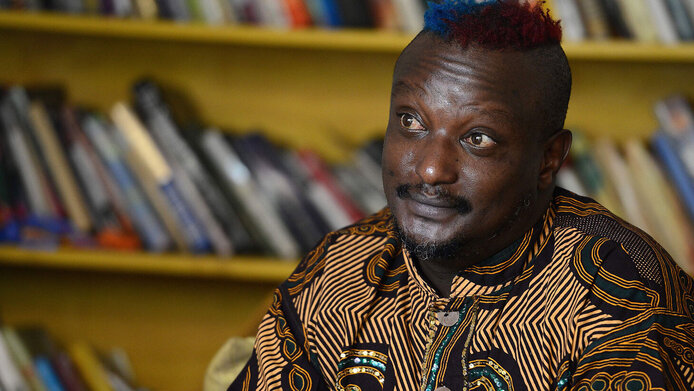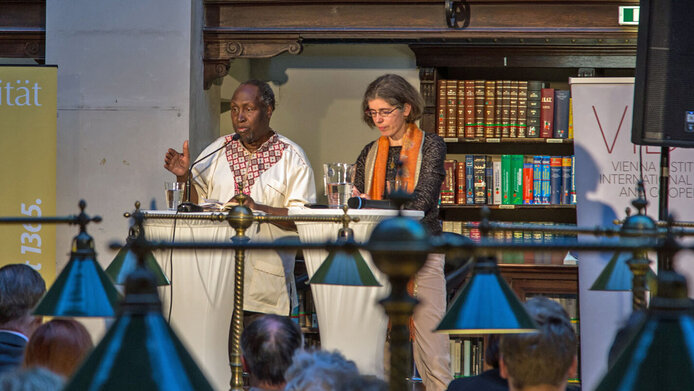The IMF generation: development aid as reflected in African literature

Many Europeans have just a few catchwords in mind when it comes to the African continent: colonialism, bloody conflicts, mineral resources, hunger, misery and refugees. It seems that an extremely undifferentiated image has become entrenched with regard to the world's second most populous continent that combines four climate zones and 54 nation states, namely that this vast and diverse continent is in need of help. Following the end of European colonial regimes in the 1960s, international institutions and NGOs were keen to provide “development aid” in Africa. In addition to their own personnel, they brought along their own ideas on development and a good life for all. Funded by the Austrian Science Fund FWF, Martina Kopf from the Institute of African Studies at the University of Vienna set out to find a “counter-design and a different perspective” on the tenacious clichés. She found it in the rich literature of English-speaking Kenyan authors, including the long-time candidate for the Nobel Prize in Literature Ngugi wa Thiong'o and Binyavanga Wainaina (1971–2019), co-founder of the Kenyan literary initiative Kwani.
Local perspective in literature
Fictional and autobiographical literature provides detailed descriptions of the effects of decades of well-intentioned development cooperation and structural adjustment programs run by the International Monetary Fund (IMF) and the World Bank. These authors describe how it felt to be branded as being in need of help and development, how well-adapted concomitant structures proved to be and what were and are the local notions of social change and good living. An African and literary scholar, Kopf is committed to transdisciplinary research. In her eyes, literature is “a good place to have a conversation about what people think and write elsewhere.” According to Kopf, many Kenyan authors consider their writing as social engagement. “After he saw a presentation of mine and the literature I used in the project, a historian at Moi University in Eldoret reminded me that all modern Kenyan literature revolves around development,” says Kopf, describing one of her research visits to Africa.

A brief history of Kenya
“It is important to understand that sovereign systems of government existed prior to colonial conquest and the arbitrary borders that resulted in today's nation-states. Kenya has a rich oral culture in several African languages, and in Swahili it also has a language with a long written tradition. They had functioning structures relating to health, religion, education, commerce and politics.” Kenya is an example of the fact that the structures created by the colonial state were carried on after the colonizers had left. But there was also a spirit of embarking on something new, and the government invested in educational and social programs. In the 1970s, when Binyavanga Wainaina was born, the middle classes of the country had a similar lifestyle to those in Europe and the US, immersed in an English-speaking culture including Dallas on television and the music of Boney M. But for many people in Europe and the US, it was the Live Aid concert organized by Bob Geldof and Midge Ure in 1985 that had the greatest impact on their perception of Africa.
In the wake of a debt crisis caused, inter alia, by the collapse of commodity prices and changes in the global capital market, the IMF and the World Bank imposed austerity programs on the Kenyan government and on other African countries until the 1990s. These programs undermined the reconstruction undertaken by the locals and resulted in rising costs for education. Kopf gives the following comparison: “Just think what would happen in Europe if, faced with the pandemic, the Ukraine war and the energy crisis, governments only went for austerity programs instead of making investments.”
The IMF generation – from elite to recipient of aid
Binyavanga Wainaina's parents sent him to South Africa for a good education, because the situation at Kenyan universities had become too difficult in the 1990s. International NGOs occupied the gap in social services that was left by the state. Between 1978 and 1988, the number of NGOs in Kenya tripled to 134. Wainaina, who was born in 1971, coined the term “IMF generation” in his memoir One Day I Will Write About This Place to describe the changes that middle-class children experienced. His generation had stepped up to shape and steer the future of Kenya. He cites the telling example of Swedish expats who demonstrated a biogas plant that made a light bulb light up at the school in Nakuru. The solution used cow dung and was most probably never applied by any Swedish household. The future elite felt reduced to an image of being unable to fend for themselves and bemoaned the fact that local expertise was hardly ever brought in to assess the suitability of solutions from outside.
In her Elise Richter project, Kopf (re)initiates the transdisciplinary discussion on economic and social development – in both theoretical and practical terms – on the basis of literature. The fundamental question underlying her research relates to what societies need in order to develop their potential and foster a good life for all. Kopf considers it obvious that especially postcolonial Kenyan authors take up important topics in literature and enable the necessary change of perspective on topics such as national reconciliation in a multi-ethnic state, class issues, gender relations, and their own history or persistent racial segregation in the cities. In light of the disregard for Kenyan educational qualifications in Europe and the business community, for which Kopf found confirmation also in Vienna’s expat community, the scholar concludes: “We live in a globalized world and work together. So we need to know who ‘the others’ are and what they can contribute.”
Personal details
Martina Kopf is a senior lecturer for African Literatures at the University of Vienna. Her research focuses on development theory and critique in the writings of African authors (Kenya) and on the history of ideas relating to development in Africa. She also works on Afro-feminist and intersectional feminist thought, as well as on issues of witness literature (genocide in Rwanda and sexualized violence). Kopf was a fellow at the Centre for Global Cooperation Research in Germany, a visiting professor at the Institute for International Development in Vienna, and did research stints in Kenya, Senegal, and Cameroon. The research project Concepts of development in postcolonial Kenyan literature received roughly EUR 270,000 in funding from the Austrian Science Fund FWF.
Publications
Kopf, Martina: Binyavanga Wainaina’s Narrative of the IMF-Generation as Development Critique, in: Journal of African Cultural Studies, 34(3), 325-341, 2022
Kopf, Martina: African Cultural Imaginaries and (Post-)Development Thought, in: Journal of African Cultural Studies 34(3), 239-242, 2022
Kopf M. and Waldburger D. (eds.): Special Section on Literature and Literary Studies in Kenya, in: Stichproben – Vienna Journal of African Studies Nr. 39, 2020
Kopf, Martina: At Home with Nairobi’s Working Poor: Reading Meja Mwangi’s Urban Novels, in: Martina Barker-Ciganikova et al. (eds.): The Politics of Housing in (Post)colonial Africa, 98-120, de Gruyter Oldenbourg 2020





